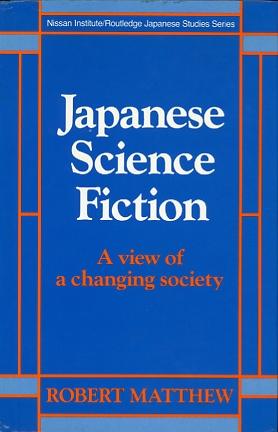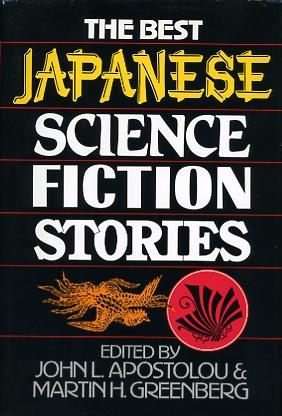Samurai in space
Japanese science fiction and society
By William Wetherall
A version of this article appeared in
Far Eastern Economic Review, 146(48), 30 November 1989, page 45
Robert Matthew, Japanese Science Fiction, 1989
Apostolou and Greenberg, The Best Japanese Science Fiction Stories,
|
A country that produces some of the world's most fantastic high-tech gadgetry must have science. If it also manufactures literature, then it probably has science fiction too.
Two new books in English show and tell that Japan has lots of SF: an anthology of translated short stories, and an academic look at how Japanese science fiction reflects real Japanese society. Well, almost real. |

Robert Matthew Robert Matthew, a Senior Lecturer in Japanese at the University of Queensland, Australia, has translated over 200 short stories of Japanese science Fiction, according to the dust cover of his interesting but not very exciting study, Japanese Science Fiction. His notes, however, do not reveal if or where these translations have been published. Matthew aims to "take a fresh look at the Japanese mind" through science fiction, which he dubiously calls "a uniquely modern medium". It takes courage to promise freshness from a stereotype as old as "the Japanese mind". And the topics he covers in fourteen chapters grouped in four parts are hardly new. Part One (The origins of Japanese science fiction) follows the genre from the beginnings in the 1880s through the period of development from 1920 to 1950. Some stories were about future warfare and "anticipated" the fall of the Japanese empire. Part Two (The concerns of a changing society) starts with the jaded Japanese citizen who need fictional diversions from the boredom of peace and safety, and continues with advertising and media, economics and commerce, human concerns and values, consciousness of generational change, and sex. Part Three (Matters of the mind and spirit) is a good example of how Matthew uses a specious technique that I call "culturalist reverse engineering" to answer his pre-answered question: what does science fiction have to tell us about aspects of "the Japanese mind" like moral values, ethics, and religious beliefs, and the psyche, perception, and emotion? Armed with all kinds of sticky labels that he has gotten from reading too many books that reduce human nature in Japan to a cultural cliche, Matthew finds examples of what he is looking for: gods with limited powers, yearnings for Nirvana, less need for individual privacy, Confucian overlays, and other themes which convince Matthew that he has discovered another karma of Japanese art and life. Part Four (The consequences of Change) explores more interesting themes like fear of excessive regimentation, alienation, and war and the bomb, among some bummers like "politico-moral" attitudes. Matthew's concludes that science fiction, like other Japanese literature, "gives [western readers] a view of the human condition that stands outside the narrow ethnocentric confines of their own preconceptions." Japanese SF is also "the only technology-conscious, forward-looking, and future-oriented literature that stands outside the western framework of ideas and western-dominated discourse." |

John L. Apostolou and Martin H. Greenberg (editors) Fortunately, Matthew's study is not a prerequisite for enjoying The Best Japanese Science Fiction Stories, edited by John Apostolou and Martin Greenberg. Some Japanese fiction may not be readable in English without a little knowledge of Japanese society. But these stories (like most of Japan's best literature) explore human themes that precede and transcend culture. "A mixed bag" would have been a more honest title than "The best". A different group of editors and translators would probably have chosen a different set of stories. Matthew's mentions only three of this anthology's thirteen stories by ten writers; and he mentions only two of the three writers who have two stories because, as Apostolou reports, they are sometimes called "the big three" of Japanese SF. But most of the stories are worth reading whatever else either Matthew or Apostolou may say about them. |